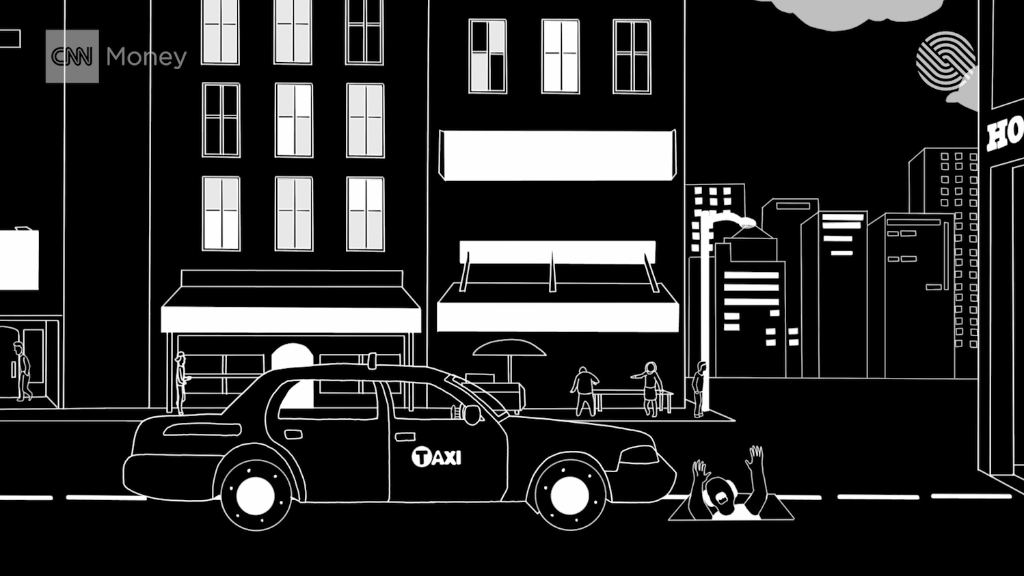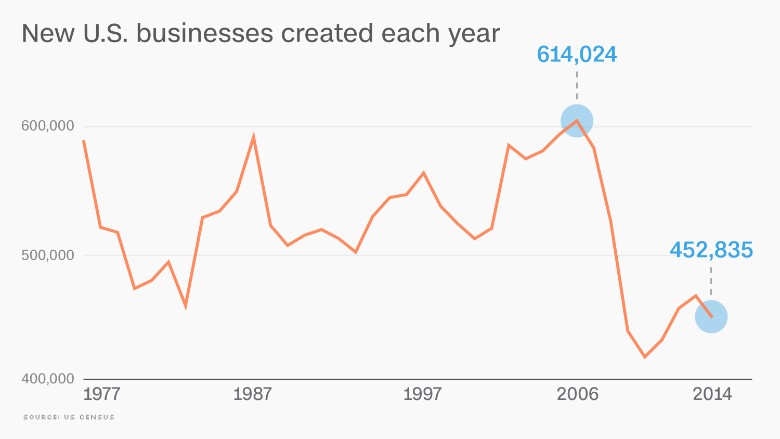
Americans have become lazy, argues economist Tyler Cowen.
They don't start businesses as much as they once did. They don't move as often as they used to. And they live in neighborhoods that are about as segregated as they were in the 1960s.
All of this is causing the U.S. to stagnate economically and politically, Cowen says in his new book: "The Complacent Class: The Self-Defeating Quest for the American Dream." Growth is far slower than it was in the 1960s, 70s and 80s and productivity growth is way down, despite everyone claiming they are working so hard.
"Innovation is painful. That's why we don't do more of it," Cowen, a professor of economics at George Mason University, told CNNMoney. His book makes the case that all of the upheaval of the 1960s and 70s caused people to strive for safety and the status quo in the decades after that.
"Just look at how people bring up children today. Often they won't even let children go outside," he says.
Even technology, the one area that has seen some innovation in recent years, has been mostly aimed at making us want to stay home and relax.
"Tech's great. It's fun. I've got four Amazon packages outside my door. But we have a problem with this precisely because it's enjoyable and comfortable," he says. "All this tech innovation encourages leisure and staying at home."
Related: Meet Khe Hy, the Oprah for Millennials
Trump is the 'great reset'
Cowen believes we've gone too far in trying to create perfect, insulated lives for ourselves and our kids. Without realizing it, we've created bubble worlds that we're afraid to change. Segregation is rampant, he argues, both by race and by class. In the south, the percentage of black students in majority-white schools peaked in 1988 at 43.5%. Today it's just 23.2%, a level similar to the 1960s.
Some point fingers at the poor or the Rust Belt as the "complacent class," but Cowen argues just about everyone in America is part of this class. He points to America's "traffic problems and crummy infrastructure."
It's an issue almost everywhere in the country, yet despite years of complaints, massive change hasn't happened. He believes the same is true in U.S. education with so many students still not meeting basic standards.
Even in the high tech cities of Silicon Valley, people have shut themselves off from other Americans who don't have the same education and income levels. It's why so many were shocked by the election of Donald Trump.
Related: Coal country's message to Trump: We want jobs of the future
Cowen calls Trump's election an attempt at a "great reset." His book points out that white males earned less in 2015 than they did in 1969, once you adjust for inflation. He dubs it "one of the most stunning facts about contemporary America."
"I think those people [in the Rust Belt] are smarter than the coastal elites have been. They actually see the problem pretty clearly," he argues.
But he thinks Trump is going to be a big disappointment.
"I sometimes call Trump the 'placebo president,'" Cowen says. "For all the talk about change, so far he's shown he can't get anything done."

Prediction for the future
So how can America get out of this complacent funk? Cowen warns that looking back at history shows it usually requires a major trauma such as a war or huge natural disaster.
But he also says the U.S. does have an amazing ability to regenerate itself, so it's possible it won't take something so extreme to reawaken America's risk-taking mojo.
His prediction for the next two years is: "Trump is seen as an ineffective president. He's checked by Congress and the courts. Slowly but surely, the nation wakes up and we acquire a greater sense of urgency."
His advice to people is to take more risk in their own lives, whether it's in their careers or personal lives.
"If you're thinking of changing your job, maybe we should do it," he says. "The people who make change, end up significantly happier than those who didn't."
Related: U.S. unemployment drops to 4.5%, lowest in decade
He points to new research from economist Steven Levitt, the author of the widely popular book "Freakonomics." Levitt did a big experiment where he took people who were having trouble making a life decision and had them flip a coin to determine what they should do.
"Those who make a change (regardless of the outcome of the coin toss) report being substantially happier two months and six months later," Levitt found.
To help jumpstart more risk taking, Cowen is calling on Trump and Congress to spend more money on research (so called R&D). He thinks we need another man on the moon moment or, better yet, a major medical breakthrough. He also thinks immigration reform is key.
"Immigrants are the greatest risk takers of all. They are the least complacent class," he says.
CNN wants to know: What do YOU think is the biggest problem with the US economy? Email: Heather.Long@cnn.com with your take.


